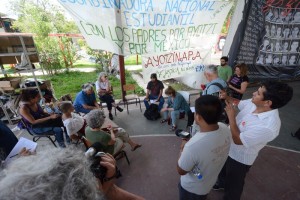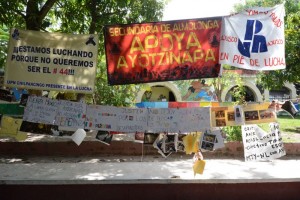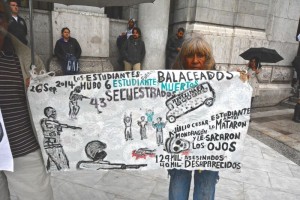 Participants of the School of the Americas Watch (SOAW) delegation in Mexico called for the suspension of Plan Merida last month after meeting with Mexican social movements and human rights organizations in Mexico City, Guerrero, and Chiapas. The visits, organized with groups actively working to end militarization and state violence in the country, took place from June 21 to July 1 and culminated in an urgent call for an end to all U.S. aid to Mexico.
Participants of the School of the Americas Watch (SOAW) delegation in Mexico called for the suspension of Plan Merida last month after meeting with Mexican social movements and human rights organizations in Mexico City, Guerrero, and Chiapas. The visits, organized with groups actively working to end militarization and state violence in the country, took place from June 21 to July 1 and culminated in an urgent call for an end to all U.S. aid to Mexico.
The delegation began in Mexico City, where they met with journalists and experts to discuss topics ranging from the effects of the new reforms on Mexican civil society to militarization. There they also visited Nestora Salgado, a U.S. citizen and leader of the community police in Olinala, Guerrero arrested in 2013, now held in Mexico City and considered a political prisoner by many international organizations. The group then traveled south to Guerrero where they met with the community police of Olinala, the Human Rights Center of the Mountain (CHRM) “Tlachinollan” in Tlapa de Comonfort, and the parents of the 43 missing students from Ayotzinapa. In Chiapas, they met with human rights defenders and visited the Zapatista autonomous community of Morelia, ending the trip in Tapachula on the southern border.
The tour was organized by SOAW, a U.S. grassroots movement that seeks to close the military training school, now officially called the Western Hemisphere Institute for Security Cooperation (WHINSEC). The U.S. Department of Defense institute provides military training to Latin American military and police officials. Among the graduates over its 60-year history are notorious dictators and human rights abusers in countries throughout the hemisphere.
Founded in 1990, SOAW allies with people in Latin America and the Caribbean to demilitarize U.S. foreign policy. In past years it has called to end the Merida Initiative, the US aid to Mexico to fight the drug war.
Arturo Viscarra, an immigration lawyer, serves as the Advocacy Coordinator for SOAW. In an interview with the Americas Program, Viscarra talked about the importance of building people power against militarization because Plan Merida supports government forces responsible for crimes like that of Ayotzinapa, Tlatlaya and the violation of Central American migrant rights.
“It is our taxes that pay for these violations of human rights and mass disappearances. So our government is complicit with organized crime and the mass graves, assassinations, and violation of human rights,” he said.
 On June 26, a date that marks the nine-month anniversary of the Ayotzinapa disappearances, the delegation held a press conference to report on visits to the Raul Burgos Rural Teachers’ College, Tixtla and Tlapa and condemned the Ayotzinapa disappearances. The group announced it will be active in U.S. campaigns to end the Merida Initiative.
On June 26, a date that marks the nine-month anniversary of the Ayotzinapa disappearances, the delegation held a press conference to report on visits to the Raul Burgos Rural Teachers’ College, Tixtla and Tlapa and condemned the Ayotzinapa disappearances. The group announced it will be active in U.S. campaigns to end the Merida Initiative.
During the conference, Viscarra stated, “The United States has provided more than $3 billion to the Mexican government since 2008, most under the Merida Initiative, and these funds have been used to deepen and expand the militarization that has caused torture, forced disappearances and displaced communities under the pretext of the war on drugs.”
Cambias, a long-time activist in Chile and the United States, reported that WHINSEC not only trains Mexican military personal in its facility in Fort Benning, Georgia but also provides training in the country. She stated that the institute has trained over 16,000 policemen over the past three years in a training center in Puebla.
She also cited the human cost of the drug war financed by the United States. She pointed to the Programa Fontera Sur, a program launched by Enrique Peña Nieto last year that increased deportations and military police presence and abuses on Mexico’s southern border – a direct result of the U.S. pressure to harden Mexico’s southern border under Plan Merida. According to the activist, “the Pentagon is spending more than $90 million to train the National Migration Institute (INM)”.
Cambias stated, “The program has increased the persecution, vulnerability, and the deportation of migrants in Mexico fleeing the violence that the U.S. itself created in their home countries.”
In recognition of the anniversary of the attacks on the students, Cambias stated, “We express our solidarity with the parents of the disappeared students of Ayotzinapa and SOAW demands the U.S. put an end to Plan Merida. It has financed the human rights violations by police and military forces, who have blatantly killed and tortured people extra-judicially.”
Delegate Theresa Camaranesi, who also participated in the press conference, reminded the audience that June 26 marked The United Nations’ International Day in Support of Victims of Torture. Camaranesi stated, “It is in this context that we express our solidarity with victims of torture and repression in Mexico and the region and we demand transparency and accountability of the State.”
Interviewed at the end of the delegation, Viscarra emphasized the critical moment Mexico faces and the conviction of many social movements that the violence and widespread human rights abuses in the country have reached a tipping point.
 “What connected everyone we talked to–from families of the disappeared, to those working on environmental issues, mining issues, community police, or migrant rights defender–was a sense of urgency. Everyone has a palpable sense of urgency that Mexico is living through a human rights crisis right now,” said Viscarra.
“What connected everyone we talked to–from families of the disappeared, to those working on environmental issues, mining issues, community police, or migrant rights defender–was a sense of urgency. Everyone has a palpable sense of urgency that Mexico is living through a human rights crisis right now,” said Viscarra.
As SOAW begins to build transborder connections with social movements and prioritizes its campaign to end Plan Merida, Viscarra affirms the need for solidarity with people being directly affected by U.S. sponsored militarization in Mexico. SOAW and its delegates plan to disseminate their findings within the organization, its supporters, and the U.S. public.
The main message, one that the majority of social movement actors wanted to transmit to the international community according to Viscarra, was that both local and federal governments and security forces are not only disinterested in protecting the lives and property of people but that they are in league with organized crime. According to them, there are no clean segments of Mexican government.
“There is a consensus that militarization is making things worse. That the state does not have a real interest in really defeating organized crime, they have more of an interest in fighting organized people, ” concluded Viscarra.
Photo Credit: Jonathan Treat



